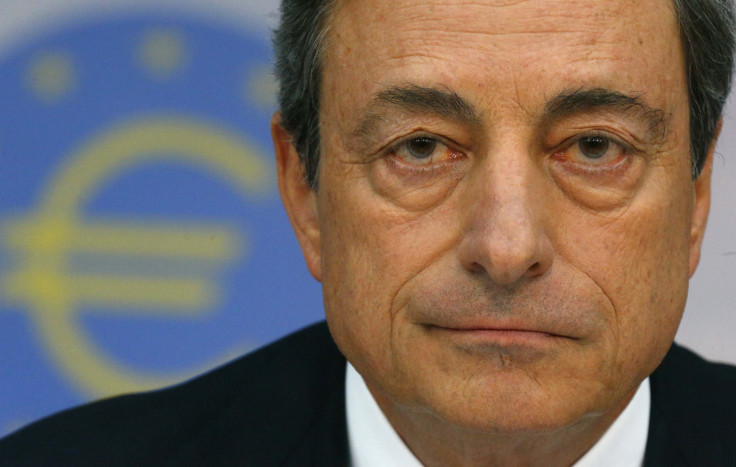ECB Meeting Preview: Will Germany Push Eurozone Into A Triple Dip Recession?

The European Central Bank is scheduled to make an announcement on Thursday regarding a possible change to Eurozone monetary policy, as weak growth raises fears of a triple-dip recession. The most pressing concern weighing on the global economy is Germany. The country, Europe's biggest economy, is showing signs of weakness after slashing its growth forecasts for both 2014 and 2015.
The ECB previously cuts rates to record lows in September as a way to fight the creeping Eurozone deflation, but the central bank’s Governing Council voted to leave its benchmark interest rate unchanged during its October meeting. Data last week revealed inflation edged up in the Eurozone in October to 0.4 percent, well below the ECB's target of just under 2 percent. As Germany continues to experience slowing export growth, ECB President Mario Draghi is facing the possibility of a triple-dip recession in the Eurozone, or rather three separate occasions of two consecutive quarters of negative GDP growth.
“Germany is really going to dictate how global markets go in the next 6 months,” said Charlie Bilello, director of research at Pension Partners, LLC. “If they can’t stabilize and they’re going down, being the strongest part of the Eurozone, then everyone is going to come down with them.”
Data on Monday revealed German factory activity came in better-than-expected in October after shrinking in September for the first time in over a year. Although the figure came in above a reading of 50, which is a key measure for contraction, Germany’s manufacturing sector is still under pressure, as it accounts for about a fifth of the economy. Germany’s manufacturing sector climbed to 51.4 from 49.9 in September, according to Markit’s Purchasing Manager's Index.
“Overall, the data send mixed signals about the health of Germany’s manufacturing sector and it is too early to say whether the sector will be able to sustain growth in the fourth quarter,” Markit said in its report.
Separate data on Wednesday showed Germany's service sector grew in October, but output and new orders both rose at weaker rates. Germany's private sector grew to 54.4 last month, down from 55.7 in September, according to Markit's Germany Services Business Activity Index. Although Germany’s service sector continued to post above the crucial 50 threshold in October, that month’s growth rate of expansion was the slowest since March.
Analysts say a lack of global growth could cause major volatility in the coming months, as slowing industrial production and manufacturing in China and deflationary fears in Europe continue to weigh on investors.
"The underlying theme here is lack of growth worldwide," said Tim Kelly, founder and managing director at ForexTV.
Just as the U.S. Federal Reserve closed the final chapter on its asset-purchasing program in Oct. 2014, other central banks around the world are taking similar action to stimulate struggling economies. The Bank of Japan surprised global markets last week after announcing a new round of bond-buying stimulus in order to boost the economy. The move sent the yen tumbling over 2 percent to a six-year low of 111.89 against the dollar. It sent the dollar surging to new highs versus the Japanese yen on Monday, soaring to 114.20 yen, its highest since December 2007.
As both China and Europe show signs of slowing growth, analysts are also focused on the U.S. Labor Department's jobs report for October on Friday to gauge financial market volatility and whether the Federal Reserve will hike interest rates sooner rather than later.
"The U.S. is the barometer,” Kelly said. “If the U.S. sneezes, the rest of the world catches a cold."
The European Central Bank will announce its latest monetary policy decision on Thursday at 7:45 a.m. EST., followed by a press conference with ECB President Mario Draghi at 8:30 a.m. EST.
© Copyright IBTimes 2025. All rights reserved.






















